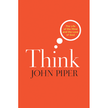Pastor and prolific author John Piper recently published a book, Think: The Life of the Mind and the Love of God. Here is a review of the book.
 |
Think: The Life of the Mind and the Love of God
By John Piper / Crossway Books & Bibles |
John Piper’s newest book Think is a challenge to better thinking and biblical thinking. His thesis, which is restated, proved, mulled over, and thoroughly communicated throughout the book is this: “The aim of this book is to encourage serious, faithful, humble thinking that leads to the true knowledge of God, which leads to loving him, which overflows in loving others.” In Piper’s view, true Christian thinking results in the carrying out of the two greatest commandments: to love God and to love others.
Commendations
- The book is easy to read. If you’re expecting a book that spends its time in the stratosphere of metaphysical cogitations, this book isn’t for you. It’s written simply and plainly. Piper is uncharacteristically autobiographical in the first few chapters, which not only provides a helpful human touch, but also makes this book relevant for real people who struggle to think correctly.
- The book is different from Piper’s other books. Some authors hit on a great theme, and proceed to write multiple books on that same theme. After a while, all of their books start sounding the same. This book does not fit that stereotype. It’s new, fresh, and different.
- The book is Gospel-focused. “Gospel” can be an evangelical buzzword, so I want to clarify that I’m using the word carefully. Piper places the act of thinking in a gospel-saturated context.
- The book drives you to the Bible. Piper maintains that thinking involves reading. And reading, for the Christian, assumes reading the Bible. For this reason, one of the implicit goals of the book is to encourage Christians to read their Bibles more and better.
- The book is relevant. There’s nothing esoteric about this book. It is as relevant as your very brain. Piper deals with hot issues like relativism and anti-intellectualism, both of which are alive and well, even in Christian circles.
- The book has short chapters. Maybe this is just me, but I liked the book because it had short chapters. It made me feel like I was reading a lot of material in a short amount of time. Since I try to read a lot, this afforded a strange sense of satisfaction to whirl through three chapters in forty minutes or so.
Observations
The book does not provide explicit practical instruction on the how-to of thinking as much as one may wish. However, he does drive the reader back to the essential outgrowth of thinking, which is reading the Bible carefully. Then, Piper gives helpful examples of how to come to the text of Scripture with an inquisitive and thoughtful approach, in order to really hear and understand what it communicates. At times, this rigorous Bible study may seem to slow and/or methodical for the “hurry-up-and-get-to-the-point” reader, but it is important, nonetheless.
Quotes
- All branches of learning—and this book about thinking—exist ultimately for the purposes of knowing God, loving God, and loving man through Jesus Christ. (21)
- The emphasis of this book on thinking is not at the expense of feeling or delighting or loving. both are essential to being human, and both are essential to glorifying God (36).
- The mind is mainly the servant of the heart. That is, the mind serves to know the truth that fuels the fires of the heart.The apex of glorifying God is enjoying him with the heart. But this is an empty emotionalism where that joy is not awakened and sustained by true views of God for who he really is. That is mainly what the mind is for (36-37).
- The glory of Christ is seen through the facts of the gospel (75).
- The same concern moves me: not only how to commend and defend Christianity to intellectuals, but how to proclaim it among my ordinary neighbors and among thousands of unreached peoples around the world who cannot wait for generations of education (79).
- Our thinking should be wholly engaged to do all it can to awaken and express the heartfelt fullness of treasuring God above all things (83).
- There is a profound sense in which being irrational is immoral (108).
- I am pleading for a hearty engagement of the mind in the pursuit of God. I am not pleading mainly for more formal education (128).
- Without a profound work of grace in the heart, knowledge—the fruit of thinking—puffs up. But with that grace, thinking opens the door of humble knowledge. And that knowledge is the fuel of the fire of love of God and man. If we turn away from serious thinking in our pursuit of God, that fire will eventually go out.
Want to read more? Buy the book.
